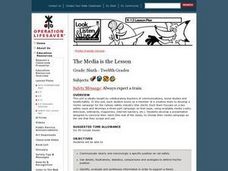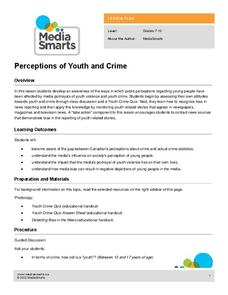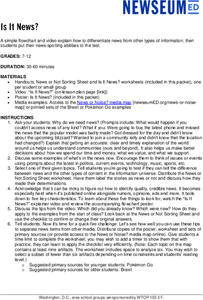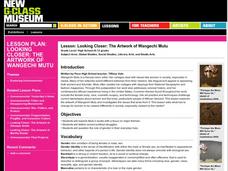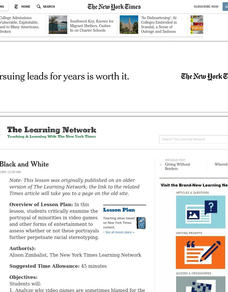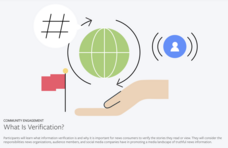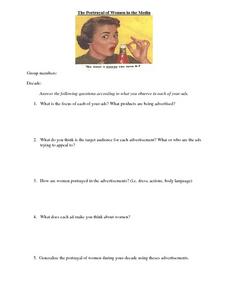Media Smarts
Learning Gender Stereotypes
How do media representations influence our attitudes? Examining advertisements through the filter of gender representation forms the basis of this, the second of three lessons that address gender stereotypes. Resources include links,...
Curated OER
Marketing to Teens: Parody Ads
High schoolers deconstruct advertising messages by analyzing parody ads and exploring the purpose of satire. Then they create their own parodies based on real ads discussed in class. A creative activity to extend any study of media,...
Curated OER
News Coverage
Learners compare and contrast methods of media coverage. In this media awareness lesson plan, students keep track of news regarding a world or national issue for the period of 1 week. Learners collaborate to describe the type of coverage...
Newseum
'The Press and the Civil Rights Movement' Video Lesson
Scholars watch a video featuring journalists who covered the civil rights movement, then respond to questions on a viewing guide. The video features interviews with participants and original news footage from the 1950s and 1960s. In...
Newseum
Free Press Challenges Through History: Analyzing Historical Sources
The debate over the integrity of stories in media is not new. Young journalists analyze historical sources that reveal freedom of the press controversies and draw parallels to challenges freedom of the press faces today.
Curated OER
The Media is the Lesson
High schoolers work as a member of a creative team and develop a media campaign for a client.
Curated OER
Media Literacy Final Project
Young scholars meet as a class to discuss a variety of media literacy topics before breaking into groups to conduct research on one aspect of the topic. In order to gather information, they watch episodes of the Simpson's television show...
Media Smarts
Perceptions of Youth and Crime
Explore the potential for bias in the news and in scholars' own attitudes and opinions. Begin with a quiz on youth crime to see how learners perceive crime among their peers. After looking at the correct answers, put individuals in...
Curated OER
Children's Media and Censorship
High schoolers form opinions about children and television censorship after analyzing literature. They complete a journal writing activity to identify the topic and make a list of inappropriate television shows for children. Next, they...
Curated OER
Debate: Press Censorship
Students consider the responsibility of the media to present newsworthy items while still protecting national security during times of war. They take sides acting as politicians and newsmen and debate the merits of censorship of the media.
Brown University
Following the U.S. Presidential Election
Election years provide the opportunity to evaluate news media as well as the next prospective president. High schoolers read about the same event in several different news sources, varying in type, origin, and political leaning, before...
PBS
Interviewing: The Art of Asking Questions
Interviewing skills are important, even outside of a news reporter's desk or employer's office. Take your class through the process of interviewing people they don't know with a set of case studies featuring journalists and various...
PBS
What Is Newsworthy?
What is news? What is newsworthy? Who decides and what criteria do they use? Introduce young journalists to the basics of reporting with this media literacy lesson plan.
Newseum
Is It News?
Is it news or not? That is the question young journalists must consider in a lesson about newsworthiness. Class members watch a short video that details five key characteristics of quality, credible news. Individuals then use these tips...
Center Science Education
Weather in the News
Tornadoes, blizzards, and hurricanes, oh my! In this instructional activity, meteorology majors compare stories of historical storms written by two or more different sources. As a result, they understand how the media portrays such...
Curated OER
Lesson: Looking Closer: The Artwork of Wangechi Mutu
Social issues of gender and media stereotypes, begins with a multi-sensory experience. Learners view the painting Backlash Blues and make critical comments based on what they see. They then read the Langston Hughes poem and listen to the...
Smithsonian Institution
POWs
Why did Vietnam POWs and their families receive more media attention than POWs in previous wars? To answer this question, class members view artifacts, read articles, and engage in class discussion. Individuals then assume the voice of...
Curated OER
Beyond Black and White
Students critically examine the portrayal of minorities in video games and other forms of entertainment and assess the role of racial stereotyping. They keep a log of media minority portrayals and respond to their findings.
West Virginia Department of Education
Intelligence of Authentic Character - News Coverage and John Brown's Raid
The resource, a standalone, shows how news coverage of John Brown's Raid began when the event happened and how that reporting shaped perception in West Virginia history. The resource includes interesting anticipatory discussion...
Facebook
Online Presence
What happens when an online post gets the wrong kind of attention? Learners evaluate the good, the bad, and the occasionally ugly side of social media posting with a instructional activity from a vast digital citizenship series. After...
Facebook
What Is Verification?
One of the most important skills news consumers and social media users must develop is the ability to determine the veracity of stories they read or view. Here's an interactive lesson plan that teaches high schoolers how to verify news...
Teaching Tolerance
You Are the Product
What does it mean for a product or service to go viral? Scholars explore the topic by reading an article about the economics of social media. After reading, they complete a 3-2-1 data chart with information they learned from the text and...
Newseum
Bias Through History: Analyzing Historical Sources
Young journalists use the E.S.C.A.P.E. (evidence, source, context, audience, purpose, and execution) strategy to evaluate historical and contemporary examples of bias in the news. The class then uses the provided discussion questions to...
Curated OER
The Portrayal of Women in Media
This is an awesome exercise. Learners use this worksheet as they examine an advertisement from a past decade (you need to provide). They answer five questions that aid them in analyzing the ad and the portrayal of women from that time...
Other popular searches
- Mean, Median, Mode
- Media Education
- Communications and the Media
- Usa and World News
- Education News
- Mean Median Mode
- Printing Press
- Mediation
- Agriculture News
- News
- Median
- News Magazines







